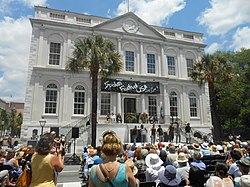Beginnings
The festival experienced financial problems from its outset which produced a quick turnover in leadership. On September 27, 1976, Theodore "Ted" Stern, the president of the College of Charleston at that time, was named as the new chairman of the Charleston Coordinating Committee after the departure of Hugh Lane. [2] Personality disputes also arose involving Menotti. Menotti, who had served as the artistic director for the festival since its founding, claimed in 1991 that he was not interested in renewing his three-year contract when it ended in 1992 over artistic differences. [3] The board did not officially accept his resignation immediately, but Menotti stood by his intentions, blaming artistic differences with the board and lack of personal control: "I no longer feel it is my festival, and this has been my life for 15 years. I feel a bit lonely among them. I'm treated like a clerk." [4]
Most significantly, Menotti had a poor relationship with the festival's general manager, Nigel Redden, who challenged programming decisions, expense accounts for Menotti, and administrative decisions by Menotti. Two camps developed on the board, splitting support between those backing Redden and those who supported Menotti (including Charleston Mayor Joseph P. Riley Jr.). Mayor Riley supported Menotti so strongly that he threatened to withdraw city support for the festival if Menotti were pushed out. [5] Eventually, in May 1991, Menotti issued an ultimatum that either Redden and his supporters resign or Menotti would. In August 1991, Redden resigned, [6] as did 19 of the 46 board members the next month.
The tumult affected the scope of the festival the following year; the budget for 1992's festival was $4.6 million, down about $1 million from 1991, and covering about 20 percent fewer presentations (103 in 1992 compared with over 120 in 1991). [7] In 1990 and 1991, the festival had raised about 44% of its budget (about $2.4 million) from private donations, but in 1992, the festival raised only $1.2 million from such donations, about 33% of its $3.6 million budget that year. [8]
By 1993, personal conflicts reached a breaking point, with Menotti and the board of the Charleston festival arguing over those in charge of the festival, its artistic direction, and financing. Menotti, who had threatened the end the festival in Charleston left the festival in 1993; the local board, however, owned the rights to the name of the festival and pledged to continue it without Menotti. [9] Milton Rhodes was appointed the general manager in November 1993, and he immediately set about righting the finances, including negotiating the cancellation of about $400,000 in debt and securing a loan from South Carolina to cover another $600,000 of debt. [10] Still, the financial difficulties continued, and the 1995 festival lost an additional $900,000. [11]
In July 1995, Redden was recruited to return to the festival on an interim basis to help it overcome a debt of more than $1,000,000. [12] The 1995 festival went over budget by 20%, and its full-time staff was cut in half. [13] During his first tenure with the festival, Redden had been successful in repairing the festival's flagging finances and left the festival having gone from a $500,000 deficit to a surplus of $1.4 million. [14] Upon his return in 1996, Redden was again successful in turning the finances of the festival around, quickly raising $1.6 million and cutting debt in half. [15]

